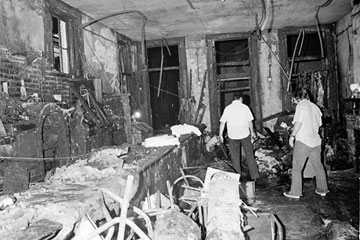
This is a view inside the UpStairs bar following a flash fire that left 29 dead and 15 injured, June 25, 1973. Most of the victims were found near the windows in the background. The bar is located in the New Orleans French Quarter.
(4 of 5)
The police focused on a second suspect, Roger Nunez, who was kicked out of the bar before the fire after fighting with another patron, according to the statement that patron, Michael Scarborough, gave to the police. On his way out, Nunez said "something to the effect of 'I'm going to burn this place down,' or 'I'm going to burn you out,'" Scarborough told police.
But before the police could interview Nunez, he had a seizure and was taken to Charity Hospital. He was admitted to the hospital and released without the police being notified. It took months for police to find him, and once they did, he denied setting the fire and said he wasn't sure if he had even been at the Upstairs that night. Nunez killed himself nearly a year later. People who knew him claimed he had confessed to a nun and also, while drunk, to a friend that he started the fire.
Gebbia says many arson investigations are easy to solve but hard to prove. "There are a lot of times you'll know, you as an investigator will know what happened, and you know who did it. But legally, if you don't have any teeth to sink in to arrest someone, you just have to wait," he says. "I'm sure in my heart of hearts this is the guy that set our fire."
A Place to Pray
A week passed before Perry finally found a church willing to hold the memorial--St. Mark's United Methodist Church. It was a brave move; the year before the Methodist denomination had decreed that homosexuality was "incompatible with Christian teaching." The day of the service, Perry promised mourners that their identities would be safe--he would not allow cameras inside the church. Midway through the final hymn, someone alerted him that television crews had set up outside. He offered mourners the chance to leave through a rear door to escape notice, but no one accepted. Then, as the Times-Picayune reported, "the mourners sang the last verse of the hymn over again and, with the existence of press cameras outside the church still in doubt, they all filed out. None was seen leaving through the rear."
That moment helped launch a new gay religious movement. The MCC was only five years old, but the Upstairs fire was the third fire in an MCC meeting place that year--arson had leveled the headquarters in Los Angeles, and a firebomb had torched a church in Nashville. Yet Perry continued to start other churches. Gay Christians needed a place to worship, he argued. "They could hurt us, they could murder us, we could die," Perry recalls telling his fledgling congregations. "But as Christians, we have to remember this Scripture, 'To be absent from this body is to be present with the Lord, so we can never fear death.' No matter what happens, this is serious, and we are not going to stop our struggle in this fight."
Those were what Perry calls the church's "persecution days." Perry helped organize a fund for the Upstairs victims. Small checks came in from tiny gay organizations all over the country, from big cities like San Francisco to small towns in South Dakota. Morty Manford, whose mother had founded PFLAG--Parents, Families and Friends of Lesbians and Gays--just two months earlier, flew to meet Perry in New Orleans to help. So did Morris Kight, president of the Gay Liberation Front, and two other clergy.
An Apology
